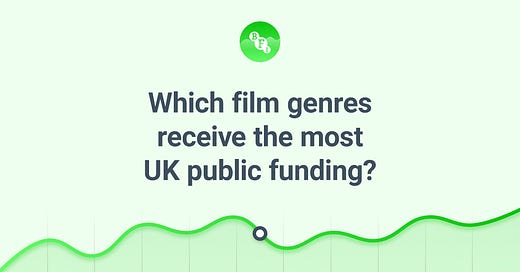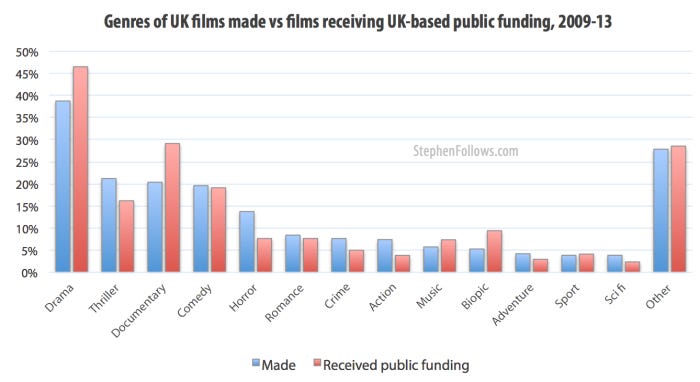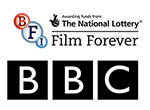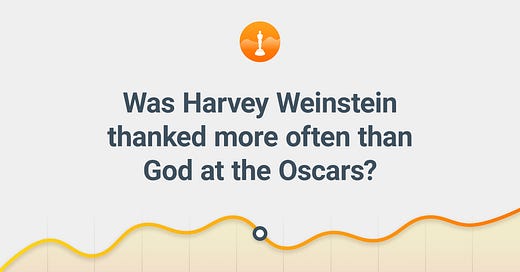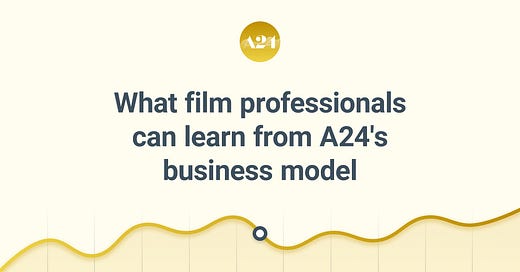
Last week I answered a question posed by someone working in a public funding institution, who wanted to know if organisations like theirs are involved with better-than-average films. The result showed that, yes, they were. This week, I am answering a question on a related topic but this time from a filmmaker. They emailed me to ask "Which genres get the most UK public funding?". In summary...
39% of UK films have drama as one of their genres
One in five of UK films have some UK public funding
55% of the films the BFI / UKFC backed 2009-13 were dramas
The BBC are half as likely as the BFI to back a thriller
Almost a third of all films backed by the BBC were documentaries
Over a five year period, the BBC only backed two horror films
Since 1980, only 4% of BBC-backed films have been horror films
The BFI fund a disproportionately large number of dramas, biopics and period dramas
The BFI fund a disproportionately small number of horror, documentary and fantasy films
45% of period dramas made in the UK received some kind of UK public funding
No fantasy or spy films made in the UK 2009-13 received UK public funding
Other genres with low levels of public support were mystery, mock-documentary, action and horror
What genres do we make in the UK?
In a few previous articles I've looked in detail at the genres favoured by British filmmakers so today I shall be brief. Of the films shot in the UK between 2009 and 2013, 38.7% had drama as one of their genres.
The figures add up to more than 100% as films tend to have more than one genre. For today's research I allowed films to have up to three genres, in line with most industry classifications (the average was 1.9 genres per film). In their annual Statistical Yearbook, the BFI assigns each film a single "primary genre", and between 2011-13 18.5% of UK films had 'Drama' as their primary genre. More about that here.
What genres receive UK public funding?
Within the 1,698 films made in the UK between 2009-13, 340 were backed financially by a UK-based public funder (20.1% of all films made).
What genres do the BFI and BBC fund?
During 2009-13, the BFI backed 141 films (8.3% of all films made). This classification includes all films which received funding for development, pre-production, production and post-production directly from the BFI or its predecessor the UK Film Council. Of those, 54.6% were dramas.
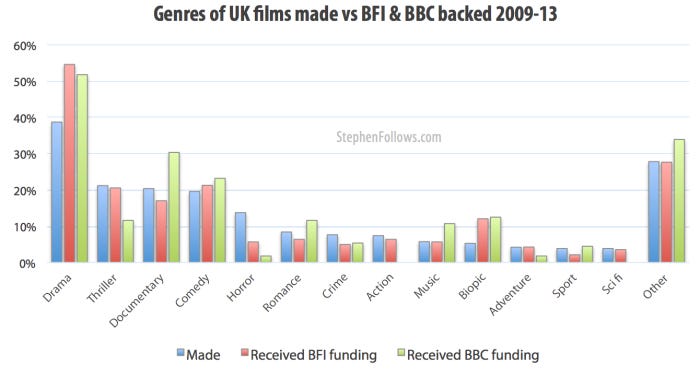
During the same period, the BBC funded 112 films, through one of their many operations (including BBC Films, BBC Scotland, BBC Northern Ireland, BBC Alba and BBC Worldwide). Only 11.6% of BBC-backed films were thrillers, way below the 20.6% of films backed by the BFI. However, they funded a large number of documentaries, meaning that almost one in every three films backed by the BBC was a documentary. Only 2 of the films the BBC backed were horror films (1.8% of their total).

In fact, I could only find eleven horror films which the BBC has ever been involved with. IMDb lists 354 films made since 1980 which were produced or co-produced by a BBC-based production companies, of which 3.1% were horror films. The eleven BBC-backed horror films are The Reflecting Skin (1990), The Relic (1997), Virus (1999), Shadow of the Vampire (2000), Close Your Eyes (2002), Trauma (2004), The Children (2008), The Daisy Chain (2008), Salvage (2009), Tormented (2009) and The Awakening (2011). For any pedants out there, I also ran the numbers exclusively on films produced or co-produced by BBC Films; nine horror films out of 219 films to date (183 already released and an additional 36 in development or production), meaning that horror represents 4.1% of their output.
The winners and the losers of UK public funding
There's no automatic reason why the BFI or BBC's funding slate should match the overall landscape of films being made in the UK. That said, I feel there will be a number of "genre" filmmakers who may feel that their projects are being overlooked.
Genres disproportionately favoured by the BFI
Drama - 15.9% difference (38.7% of films made and 54.6% of films BFI backed)
Biopic - 6.8% difference (5.3% of films made and 12.1% of films BFI backed)
Period drama - 3.2% difference (1.7% of films made and 5.0% of films BFI backed)
Genres disproportionately unloved by the BFI
Horror - 8.1% difference (13.7% of films made and 5.7% of films BFI backed)
Documentary - 3.3% difference (20.4% of films made and 17.0% of films BFI backed)
Fantasy - 3.1% difference (3.1% of films made and 0% of films BFI backed)
So what are your odds of being supported?

So far I have been looking at what genres public-backed films fall into. Another way to think about the same data is to look at what percentage of all the films made in a particular genre received UK public funding. For example, during the period 2009-13, there were 29 period dramas shot in the UK, and of those 7 received funding through a BFI / UKFC scheme. So, although overall period dramas only made up 5% of the films the BFI backed (29 out of 141 films), 24% of all the period dramas received BFI money (7 out of 29 period dramas). I am using this as a very rough guide to your chances of getting public support if you're planning to make a film in a particular genre. It's worth noting of course that getting funding is down to much more than just luck, but it does reveal the types of films that public funders are looking for and whether your funding application will face an easy or icy reception. 44.8% of period dramas made in the UK 2009-13 received some UK public funding. The genres with the next highest level of support are biopics (36%), documentaries (28.8%) and gay interest films (28%). I can't find a single fantasy or spy film made in the UK in the five years between 2009 and 2013 which received any UK public funding. The other genres will low levels of support were mystery (4.7% of mystery films received public support), mock-documentary (5.6%), action (10.4%) and horror (11.2%).
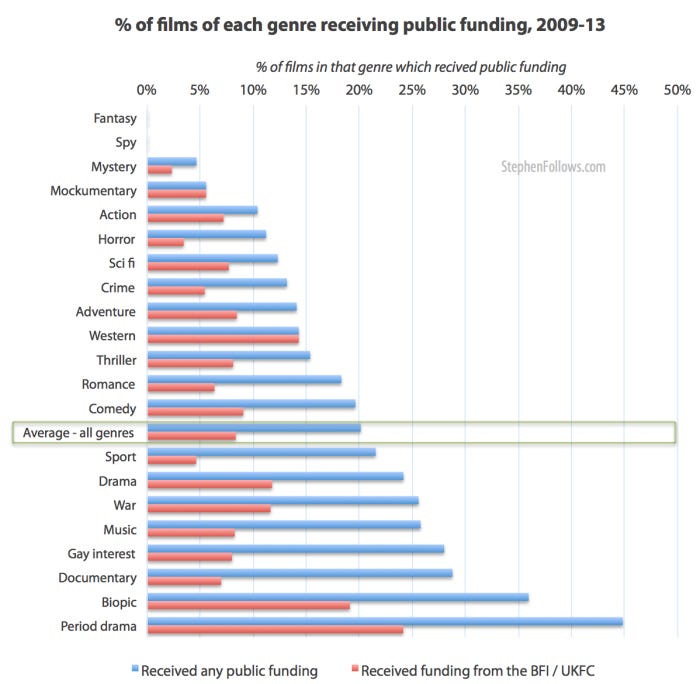
Notes on UK public funding
The funders I included in the "UK-based public funding' category are....
BFI / UKFC funding for development, production, completion, distribution and exhibition.
BBC including BBC Films, BBC Scotland, BBC Northern Ireland, BBC Alba and BBC Worldwide
Irish Film Board
Creative Scotland
Scottish Screen
Scotland South West Screen Commission
Scottish Development Fund
Northern Ireland Screen
Northern Ireland Film & Television Commission
Northern Ireland Lottery Fund
Northern Film & Media
NW Vision EM Media
Screen Yorkshire
Film Agency for Wales
Wales Creative IP Fund
The Welsh Assembly
Film London
Creative England
Screen South
Arts Council England
BritDoc
NFTS
South West Screen
Wellcome Trust
Screen East
Screen West Midlands
Isle of Man Film
Throughout this article, whenever I use the phrase 'BFI' I am referring to both the current BFI and their predecessor, the UK Film Council. My database of films is based on raw material supplied by the BFI and I have then built upon it, cross-referenced with other public data sources. To read more of my work on genre in UK film , you may like to check out these articles...
Epilogue
I am rather enjoying this journey into the world of public funding for films. I have a couple of other angles to explore but always welcome questions from readers, so feel free to drop me a line if there's anything you want to know about publicly backed UK films.


